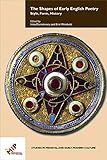The Shapes of Early English Poetry : Style, Form, History / ed. by Eric Weiskott, Irina Dumitrescu.
Material type: TextSeries: Studies in Medieval and Early Modern Culture ; 64Publisher: Kalamazoo, MI : Medieval Institute Publications, [2019]Copyright date: ©2019Description: 1 online resource (400 p.)Content type:
TextSeries: Studies in Medieval and Early Modern Culture ; 64Publisher: Kalamazoo, MI : Medieval Institute Publications, [2019]Copyright date: ©2019Description: 1 online resource (400 p.)Content type: - 9781580443593
- 9783110626605
- 9781580443609
- English poetry -- Middle English, 1100-1500 -- History and criticism
- English poetry -- Old English, ca. 450-1100 -- History and criticism
- Altenglisch
- Dichtung
- Mediävistik
- Mittelenglisch
- Poetik
- LITERARY CRITICISM / European / English, Irish, Scottish, Welsh
- Medieval Studies
- Middle English
- Old English
- Poetics
- poetry
- online - DeGruyter
- Issued also in print.
| Item type | Current library | Call number | URL | Status | Notes | Barcode | |
|---|---|---|---|---|---|---|---|
 eBook
eBook
|
Biblioteca "Angelicum" Pont. Univ. S.Tommaso d'Aquino Nuvola online | online - DeGruyter (Browse shelf(Opens below)) | Online access | Not for loan (Accesso limitato) | Accesso per gli utenti autorizzati / Access for authorized users | (dgr)9781580443609 |
Frontmatter -- Contents -- Acknowledgments -- Roberta Frank’s Publications, 1970–present -- Introduction -- Part 1. Seasons -- Weathering Time in the Wanderer -- Beowulf as Anti-Virgilian World Literature Archaeology, Ekphrasis, and Epic -- A Portrait of the Translator as Grendel’s Mother The Postcolonial Feminist Polyphony of Meghan Purvis’s Beowulf -- Part 2. Engines -- Light Verse in Anglo-Saxon England -- The Paris Psalter and English Literary History -- Generative Form -- Kennings and Things: Towards an Object-Oriented Skaldic Poetics -- Part 3. Discordance -- Lydgate’s Missing “Ballade” and the Bibliographical Imaginary -- Spoiled and Eaten: Figures of Absorption in Medieval English Poetry -- “Gehyre se ðe wille”: Sonic Worlds in Old Testament Poetry -- Notes on Contributors -- Index
restricted access online access with authorization star
http://purl.org/coar/access_right/c_16ec
This volume contributes to the study of early English poetics. In these essays, several related approaches and fields of study radiate outward from poetics, including stylistics, literary history, word studies, gender studies, metrics, and textual criticism. By combining and redirecting these traditional scholarly methods, as well as exploring newer ones such as object-oriented ontology and sound studies, these essays demonstrate how poetry responds to its intellectual, literary, and material contexts. The contributors propose to connect the small (syllables, words, and phrases) to the large (histories, emotions, faiths, secrets). In doing so, they attempt to work magic on the texts they consider: turning an ordinary word into something strange and new, or demonstrating texture, difference, and horizontality where previous eyes had perceived only smoothness, sameness, and verticality.
Issued also in print.
Mode of access: Internet via World Wide Web.
In English.
Description based on online resource; title from PDF title page (publisher's Web site, viewed 25. Jun 2024)


